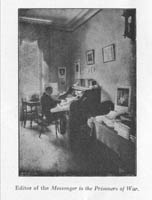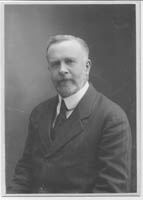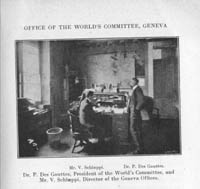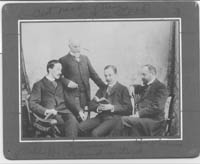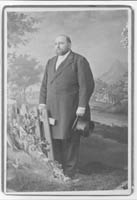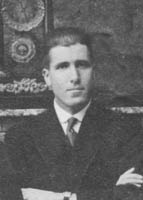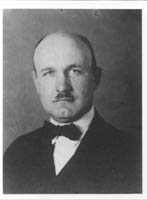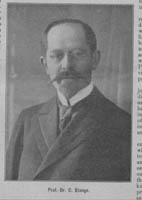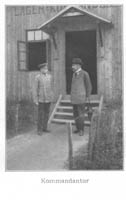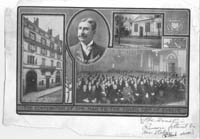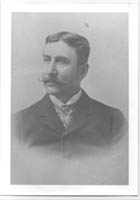Table of Contents
Key Figures
YMCA Secretaries
a | b | c | d | e | f | g | h | j | k | l | m | n-o | p | r | s | t-u | v | w | y-z
Ernst Sartorius
A Swiss World's Alliance Secretary from 1910 to 1930, Sartorius was the secretary of the Sachsenhausen Association near Frankfurt-am-Main, Germany before joining the World's Committee. He replaced Baron Waldemar von Starck in 1910, who had served the World's Alliance as librarian and supervisor of German language publications. Sartorius became the Assistant and Associate to the General Secretary of the World's Committee in Geneva. He replaced W. Gottsched as the editor of The Messenger to Prisoners of War, a World's Alliance monthly journal for prisoners of war across Europe. In December 1916, Christian Phildius received initial permission from the Bulgarian government to send War Prisoners' Aid Secretaries to provide welfare services for Allied POW's in the kingdom. The World's Alliance sent Sartorius as the Senior WPA Secretary in Bulgaria and he set up his headquarters in Sofia. He assembled a staff of seven WPA Secretaries, most of them from Switzerland, and expanded POW relief operations. Sartorius coordinated the Red Triangle workers activities through monthly WPA meetings in Sofia, beginning in January 1918. When John R. Mott traveled to Geneva in April 1918 to address the complaints of the German Association regarding his participation in the Root Mission to Russia and Archibald Harte's POW diplomacy, Sartorius participated in the World's Committee meeting. In August 1919, Sartorius supported the Société des Secours aux Prisonniers bulgares request for the World's Alliance to send assistance to Bulgarian prisoners of war in Greece and Serbia. In support of this call, the World's Alliance dispatched Fritz von Steiger and Jean Paul Graenicher to begin postwar WPA operations on behalf of Bulgarian prisoners. After the war, Sartorius attended the YMCA Emigration Workers Conference in 1921 and became involved in this committee's work with the International Labor Organization. He also began to visit Associations in Czechoslovakia, Estonia, Poland, and Romania on a regular basis. These organizations were heavily Protestant and had large German minorities. They established a relationship with the German National Alliance and Sartorius' work helped establish a bridge between these minority Associations and the World's Alliance. In 1927, the World's Committee appointed Sartorius to the new Committee of the Young Men's Division.
Emmanuel Sautter (1862-1933)
A French YMCA leader, Sautter served as one of the World's Committee General Secretaries from 1911 to 1917. In August 1891, Sautter attended the Twelfth World's Conference in Amsterdam as a French representative and became active in the World's Alliance. He was elected General Secretary of the Union Chrétienne des Jeunes Gens (the French Young Men's Christian Association) in 1894. Sautter gave an address at the Fourteenth World's Conference in Basle, Switzerland in July 1898. He gave another paper on the choice and training of general secretaries at the Versailles Plenary Meeting in 1900. Sautter invited the World's Alliance to hold the organization's jubilee celebration in Paris in 1905. He planned the Sixteenth World's Conference, held in April 1905, which reaffirmed the Paris Basis. Sautter traveled to Japan to attend the World's Student Christian Federation Conference in Tokyo in April 1907. With the resignation of Reinhold Sarasin-Warnery in 1910, the World's Committee decided to select a French representative to serve as a new general secretary with Charles Fermaud and Christian Phildius. The committee appointed Sautter and he began his term in June 1911. He traveled across the Atlantic from May to July 1914 to represent the World's Committee at the First South American International Convention in Montevideo, Uruguay. This conference led to the establishment of the South American Federation, an organization consisting of seven Associations in Brazil, Argentina, Chile, and Uruguay. When the First World War began, Sautter requested a furlough from the World's Committee to work with French soldiers (he maintained close contact with the World's Committee during his absence). In January 1915, Sautter opened the first Foyer du Soldat (Soldiers' Home) for the French Army based on a promise by John R. Mott that the American YMCA would provide financial support for the operation. After the United States entered the war in April 1917, the American Association increased its financial and manpower assistance to the Foyer du Soldat program. Under the direction of Sautter, the YMCA established 1,534 Foyers by June 1919. They were supported by 1,682 Red Triangle workers of which one-third (690) were American secretaries. Although Sautter resigned as a General Secretary in 1917, he remained active in the World's Committee. In March 1919, he vigorously opposed a plan by the American and British Associations to establish a new "League of National YMCA's." Because these two national organizations represented the majority of Associations, Sautter argued that such an organization would effectively dissolve the World's Committee. The Americans decided to table the plan in April 1919 in light of the World's Committee criticisms.
Eduard Schaetti
This Swiss YMCA secretary was among the first to volunteer to serve as a World's Alliance War Prisoners Aid Secretary in Germany after the American WPA workers left in February 1917. Schaetti arrived in July 1917 and worked in prison camps in Brandenburg and Prussian Saxony, primarily in the Garde de Corps (Berlin), the III Army Corps (Berlin), the IV Army Corps (Magdeburg), and XI Army Corps (Cassel) districts.
Victor Schlaeppi
The bureaucratic backbone of the World's Committee, Schlaeppi became a World's Alliance Secretary in 1884, serving as the assistant to Charles Fermaud. Schlaeppi attended the Continental Secretaries' Conference at Interlaken, Switzerland in June 1889. He learned a number of languages and coordinated the administrative work of the World's Committee. In 1910, Schlaeppi officially became the Director of the Geneva office. He played a critical role in organizing the Association during the war, serving as the Director of the War Prisoners' Aid Inquiry Office. Schlaeppi issued reports; organized the network of religious activities; answered inquiries about missing prisoners of war; purchased and shipped books, food, clothing, and religious books to POW's; supervised a publishing program that printed over one million books and pamphlets; and directed the publication of the monthly newspaper, Messenger to the Prisoner of War. Schlaeppi participated in POW diplomacy after the United States government declared war on Germany. In April 1917, the World's Committee sent Schlaeppi to Berlin, where he learned from Pastor A. W. Schreiber that the German government planned to demand that all American WPA Secretaries immediately cease POW relief operations across Europe. This demand would have resulted in the collapse of the WPA system and Schlaeppi persuaded the Germans to delay their decision. In April 1918, Schlaeppi participated in the meeting in Geneva when John R. Mott arrived to explain his role in the Root Mission and the activities of Archibald Harte to the members of the Executive Committee. Schlaeppi resigned from World's Alliance service in 1929.
Friedrich von Schlümbach (d. 1901)
An American of German birth, Pastor von Schlümbach played a leading role in the organization of the German National YMCA. He worked for the International Committee as First Secretary of German YMCA's in the USA in the 1870's and early 1880's. Due to ill health, he returned to Europe where he attended the London Conference in 1881. During the convention, von Schlümbach met the leaders of the Rhenisch-Westphälische Bund. They invited von Schlümbach to attend their annual meeting in Elberfeld. The German Association Movement was deeply divided; there were five different regional organizations (Bünde) and no national body. Pastor von Schlümbach was instrumental in creating a National German YMCA Association, organizing the First National Convention of all of the German Associations at Detmold in September 1882. From this start, von Schlümbach established the Berlin YMCA in January 1883, based on the American model. In 1892, von Schlümbach returned to the United States and became the pastor of the Schiffein Christi Church in Cleveland.
Jean A. Schoop
This Swiss YMCA secretary was a German Swiss national and had extensive overseas experience. He was the General Secretary of the German Association in St. Petersburg from 1902 to 1914 and spoke fluent Russian, English, and German. In March 1916, he volunteered for War Prisoners' Aid work in Austria-Hungary and set up the WPA headquarters in Vienna. In July 1916, he supervised the construction of the Association hut at Sopronnyek for Russian war prisoners in Hungary. He also served Serbian POW's at Bolodogasszony, in Hungary, remodeling a building into an Association hall and setting up three elementary schools to help Serbian prisoners learn to read and write.
A.W. Schreiber
A German pastor, Reverend Schreiber served as the secretary for the German Evangelical Missions' Aid, established in December 1914 to provide spiritual relief to Allied prisoners of war in German prison camps. Schreiber met with Archibald Harte and Christian Phildius in Berlin in February 1915 when Harte was investigating the possibility of establishing POW relief operations in Germany. Schreiber informed the two Association secretaries that the Ministry of War was interested in developing a POW relief program on a reciprocal basis with the Allied Powers and he recommended that the German YMCA throw its support behind Harte's proposal. Schreiber arranged for Harte and Phildius to visit officials in the Foreign Office to explain their plans. In March 1915, Schreiber received a message from the Ministry of War which officially welcomed the American YMCA to begin War Prisoners' Aid operations in German prison camps. Schreiber accompanied Harte and Phildius on inspection visits to the prison camps at Göttingen and Crossen-an-der-Oder to develop a relief plan. In April 1917, after the United States government declared war on Germany, Schreiber met with Victor Schlaeppi, the Director of the World's Alliance Geneva Office in Berlin. Schreiber informed Schlaeppi that the Ministry of War planned to demand that American WPA Secretaries immediately cease all POW relief operations across Europe, a demand that would result in the collapse of the WPA system. Schlaeppi was able to convince the German government to rescind their decision.
G. Schrenk
A German pastor, Reverend Schrenk became interested in the welfare of Allied prisoners of war in German prison camps early in World War I. He was a leader of the Committee for Pastoral Work in German Prisoners' Camps and distributed 250,000 Testaments, with three assistants, to Allied POW's during the first year of the war. In June 1915, Schrenk became a War Prisoners' Aid Secretary under the direction of Conrad Hoffman and worked with Allied prisoners until January 1916. Schrenk worked in prison camps in the VII Army Corps (Münster) based in Westphalia. He worked with the commandant at Crossen-an-der-Oder to construct a YMCA hall for the benefit of the prisoners during the Summer of 1915.
Theodore F. Schroeder
This American YMCA secretary volunteered to serve Allied prisoners of war in Austro-Hungarian prison camps as a War Prisoners Aid Secretary. Schroeder arrived in Austria in March 1916 and began welfare operations in Spratzern and Neulengbach in Lower Austria (Niederösterreich). Schroeder was among the first American Red Triangle workers to arrive in the Dual Monarchy. He established school systems in both camps, designed to teach illiterate Russian soldiers to read and write. At Neulengbach, Schroeder also set up a vocational school to teach prisoners new trades. He left Austria-Hungary in September 1916.
Walter S. Schutz
The International Committee of the American YMCA recruited Schutz to serve as a Field Worker in France, serving American and French soldiers during the First World War. In November 1918, the Paris YMCA Headquarters instructed Schutz and James Perry to gather supplies to meet released American prisoners of war crossing the French border from Baden in Germany.
Richard Siegfried Schwedler
An American YMCA secretary, Schwedler volunteered for War Prisoners' Aid (WPA) service in Austria-Hungary during World War I. Schwedler received his assignment in March 1917, but was unable to go into the field as relations between the United States and the Dual Monarchy deteriorated in response to the severing of diplomatic ties between the U.S. and Germany in February. Most of the American WPA secretaries working in Austria-Hungary left the empire in April and were replaced by YMCA workers from neutral countries.
Charles Seitz
This American YMCA secretary provided relief operations to members of the Allied Expeditionary Force in Archangel in 1918 and 1919. Seitz then volunteered to support the repatriation of Russian and Central Power prisoners of war in Estonia in 1920 with Herbert Gott and Amos Ebersole. This work, which began with relief for Russian refugees, eventually led to the establishment of the Estonian National YMCA.
H. Shoemacher
This Swedish YMCA secretary volunteered to conduct POW relief work in Austria-Hungary as a replacement worker for the American War Prisoners Aid Secretaries who left the Dual Monarchy. Shoemacher arrived in Bohemia in November 1918, just before the Austrians signed their Armistice, and was responsible for supervising the inventory inspection of Association equipment in the prison camp at Milowitz.
Arthur R. Siebens
This American YMCA Secretary volunteered to serve Allied prisoners of war in Germany as a War Prisoner Aid Secretary. He arrived in Germany in November 1916 and Conrad Hoffman assigned him as a Field Secretary. Siebens left Germany for Switzerland with most of the other American WPA Secretaries in February 1917, after the United States broke off diplomatic relations with the German Empire. The American YMCA assigned Siebens to work in Russia in March 1917 where he conducted war relief work with the Russian Army.
Friedrich Wilhelm Siegmund-Schultze
A German student leader, Siegmund-Schultze played a leading role in the development of the German Christian Student Movement (GCSM). He met John R. Mott in March 1912 when the American General Secretary visited Germany. Mott raised half of Siegmund-Schultze's salary and persuaded the American YMCA to develop social centers for German students as well as fund a full-time secretary for international students in Germany. Siegmund-Schultze traveled to the United States in June 1913 to serve as a German delegate at the World's Student Christian Federation Conference at Lake Mohonk, New York. He met Mott again in October 1914 in Berlin, when the American YMCA leader was conducting his investigation to see how the American Association could best serve war victims. Mott met with Siegmund-Schultze, Gerhard Niedermeyer, Georg Michaelis, and other GCSM leaders to determine how the United States could assist German students. The German leaders established the German Student Service for students mobilized by the German Army. In June 1915, when Mott returned for another tour of Europe, the American General Secretary met with Siegmund-Schultze, Niedermeyer, and Theophil Mann to review developments in student relief efforts. With the end of the war and the emerging schism between the American and German YMCA's, Siegmund-Schultze and Mann cabled Mott in early 1919, urging him to visit Germany. This led to Mott's June 1920 trip to Berlin where he frankly discussed outstanding issues with German Christian student, missionary, and YMCA leaders. The trip was an important first step in healing the wounds between the Germans and Americans. Siegmund-Schultze continued to work closely with Mott in developing the WSCF. In 1927, Siegmund-Schultze and Mott attended the Lausanne Conference on Faith and Order and met with Orthodox ecclesiastics about developing the student movement in Eastern Europe.
Johannes Siemsen
A German student leader, Siemsen attended the Keswick Student Conference in England in late June 1894 with Fritz Mockert. John R. Mott was impressed with the young Siemsen, a law student in Berlin, and thought Siemsen would be a good student secretary for Germany. The Keswick meeting addressed the issue of transforming the Student Volunteer Movement into a global organization. When the German Christian Student Movement (GSCM)was established in 1895, the delegates selected Siemsen to represent their organization at the Scandinavian Conference scheduled for August 1895. They directed Siemsen to commit the GCSM to the new federation under development. The student representatives met at Vadstena, Sweden in the 16th century castle and framed the World's Student Christian Federation. The delegates elected Siemsen to serve as the Vice President for the new organization.
James E. Siordet
A Swiss pastor, Reverend Siordet served as a World's Committee Secretary from 1920 to 1926. He was involved with the World's Alliance during World War I and he attended the April 1918 meeting of John R. Mott and the Executive Committee in Geneva. During this stormy session, Mott defended the actions of Archibald Harte in administering the War Prisoners' Aid program as well as his own decision to participate in the Root Mission to Russia on behalf of the Wilson administration. After Siordet became a World's Committee Secretary, he spent two years developing a training program for World's Alliance secretaries, a project that many members of the committee deemed "too complex and difficult." Despite these concerns, Siordet opened the International Training School for Secretaries and Religious Work in 1922. Siordet also worked closely with Karl Fries to bring about a reconciliation between the German and French Associations. He attended the French National YMCA Conference in Strasbourg, France in November 1923 when the French Association issued its declaration regarding outstanding issues with the German Association. At the request of the Paris Evangelical Missionary Society, Siordet visited Associations in South Africa from April to November 1923. He examined Red Triangle work among the indigenous peoples in Basutoland and among the Bantus. In his report, Siordet recommended that the World's Alliance send a secretary to South Africa to work with native peoples and white youth in Southern Rhodesia, Natal, the Cape Colony, and/or the Orange Free State to promote and expand Association work.
Paul Sjöberg
The Swedish National YMCA Council sent Sjöberg to Germany as a replacement worker for the American War Prisoners Aid Secretaries who left the Reich in February 1917. Sjöberg worked in prison camps in Hannover assigned to the X Army Corps, based in Hannover.
Treadwell Smith
An American Rhodes scholar at Oxford University, Smith volunteered for War Prisoners' Aid work for Russian prisoners of war during the repatriation process in the Summer of 1920. He was an experienced traveler, visiting South Asia and the Far East during World War I. Smith served with Donald Lowrie on board a steamer which ran between Stettin, Germany and Narva, Estonia. This steamer service carried former Russian prisoners from Germany to Estonia and released Central Power prisoners from Russia to Stettin. Smith helped develop WPA operations on board ship and at the port of Narva.
Joseph J. Somerville (d. 1964)
This American YMCA secretary worked for the Associations at Indianapolis, Omaha, and Richmond, Virginia between 1912 and 1916. Somerville then volunteered for War Prisoners Aid (WPA) service for Central Power prisoners of war in Russia. By early 1920, Somerville was in London, preparing to return to Russia when he learned of the plight of Russian POW's in Germany. He began conducting WPA relief operations in May 1920 at seven prison camps in Westphalia and Hannover. With the restoration of repatriation operations between Germany and Russia, Somerville left German WPA work in April 1921 and departed to work with Russians in Latvia and Czechoslovakia. In 1934, Somerville became the General Secretary of the Portsmouth, Virginia YMCA. He left Association work in 1935 and obtained a position at Ohio Wesleyan University.
F. A. Speicker
A German humanitarian, Dr. Speicker served as the President of the German Evangelical Missions' Aid during World War I. The Germans organized this committee in December 1914 to provide spiritual relief to Allied POW's in German prison camps. The organization received permission from the Ministry of War to set up relief operations and support Archibald Harte's proposal for the American YMCA to begin similar services to war prisoners.
Franz Spemann
A German pastor and leader in the German Christian Student Movement (GCSM), Reverend Spemann, along with Georg Michaelis and Gerhard Niedermeyer, met with John R. Mott in October 1914 in Berlin during the American General Secretary's first wartime tour of Europe. Mott and the GCSM leadership discussed ways the American YMCA could assist students mobilized by the German Army. In March 1915, Spemann met with Archibald Harte and Christian Phildius, along with several German and Swedish pastors, to consider work among Allied prisoners of war. Spemann was enthusiastic about developing welfare work for Allied students in German prison camps and believed this service would result in friendlier relations after the war. Spemann offered to work for the American YMCA to extend relief to POW's if the International Committee in New York paid for half of his salary.
James E. Sprunger
One of the original members of the "Flying Squadron" recruited by the International Committee in New York to conduct War Prisoners' Aid (WPA) operations in Europe, Sprunger and Conrad Hoffman arrived in Germany in October 1915 to initiate work. The two YMCA secretaries took an extensive tour of prison camps in Baden, Hesse-Darmstadt, and Hesse-Nassau and they persuaded Prince Maximilian of Baden to serve as the president of the WPA Committee in Germany. Hoffman originally assigned Sprunger to work in prison camps in the XVIII Army Corps region, based in Frankfurt-am-Main, and Sprunger extended his operations to include the XI Army Corps, headquartered in Cassel. He recruited faculty members from the University of Darmstadt to offer courses to prisoners who were still in college. He ran into administrative problems at Giessen; the facility was divided into compounds and German authorities initially wanted Sprunger to establish Associations in each individual section of the prison. Sprunger determined this would be redundant and inefficient and he persuaded the commandant to allow prisoners who served as Association officers to freely travel between the compounds to conduct welfare work. At Ohrdruf in Thuringia, Sprunger requested funds from the International Committee to raise a YMCA hall. New York provided $2,000 and Sprunger and the prisoners raised the remainder of the funds through canteen sales to construct the building. In February 1916, Sprunger had to leave Germany after he contracted a serious case of influenza.
Carl Stange
A German professor and YMCA leader, Dr. Stange served on the faculty of the University of Göttingen. With the outbreak of World War I, Stange became interested in the welfare of Allied students in German prison camps. Stange joined Archibald Harte, Christian Phildius, and A. W. Schreiber in developing an Association program for the prison camp at Göttingen. He offered weekly lectures, published a bi-monthly newspaper for French and Belgian prisoners, provided a small library for the prison, and enlisted other faculty members to teach courses at the facility. He also experimented with pedagogy by teaching German to a class of sergeants, who, in turn, taught German classes to enlisted men. He gave one of the addresses at the inauguration of the YMCA hall at Göttingen, the first American YMCA established in a European prisoner of war camp. Stange wrote a book about the prison entitled Das Gefangenenlager in Göttingen. Archibald Harte criticized Stange after the war for the latter's emphasis on German Kultur and offering POW's the opportunity to learn the superiority of German civilization and higher thinking.
Fritz von Steiger
A Swiss YMCA secretary, von Steiger volunteered to serve as a World's Alliance War Prisoners Aid Secretary to work with Allied prisoners of war in Bulgaria. He was one of five secretaries supervised by Ernst Sartorius. Von Steiger returned to Switzerland in January 1919 and attended the WPA conference in Regensburg, Switzerland in July 1919. At the request of the Société de Secours aux Prisonniers bulgares in August 1919 and the Bulgarian government in September 1919 to provide POW relief for Bulgarian prisoners of war in Greece and the Kingdom of the Serbs, Croats, and Slovenes, the World's Alliance sent von Steiger and Jean Paul Graenicher to investigate the situation in the Fall of 1919. Von Steiger and Graenicher conducted negotiations with the Greek and Yugoslav governments and inspected prison camps in both countries. Both kingdoms invited the World's Alliance to set up WPA operations and the two YMCA secretaries established centers in Athens and Belgrade. Von Steiger and Graenicher began WPA work in Greece in November 1919, implementing service in nine prison camps, including two on Crete, and in the Kingdom of the Serbs, Croats, and Slovenes by March 1919.
Karl Stettler
A Swiss YMCA secretary, Stettler volunteered to serve in the War Prisoners' Aid (WPA) program and arrived in Austria-Hungary in April 1917 as one of the neutral replacements for the departing American WPA Secretaries. Stettler worked in prison camps in Oberösterreich, starting at Kleinmünchen in April and expanding operations to Mauthausen four months later. Stettler served as an important bridge during the transition between the American withdrawal and neutral replacement period in WPA service in the Dual Monarchy.
James Stokes (1841-1918)
A wealthy New York philanthropist, Stokes was prominent in the New York Association and became a member of the International Committee. He would serve the American YMCA until his death in 1918. Stokes took a deep interest in developing Associations across Europe based on the North American model. He concentrated first on developing the YMCA in France. From 1886 to 1887, Stokes paid for a French secretary to visit the United States to study American Association methods. He paid the salary of Franklin A. Gaylord in 1887 to go to France as a secretary to promote the Paris Association. Stokes also convinced Richard Morse to sent Thomas K. Cree to Paris to further expand the French YMCA. In the early 1890's, Stokes purchased a building in Paris for the benefit of the French Association. In the mid-1890's, Stokes paid for an Italian student to attend Springfield College and rented rooms in Rome for the new secretary. In 1897, Stokes purchased the building for the Rome Association to serve as the basis for the Italian YMCA. In 1898, Stokes' attention turned to Russia. He visited St. Petersburg and met with Tsarina Alexandra. She granted permission for Stokes to study welfare organizations under her patronage with the goal of eventually establishing a young men's society. In 1899, Stokes dispatched Clarence J. Hicks to organize a Railroad Association in Russia with the support of the Ministry of Ways and Communications. Hicks persuaded the Prince of Oldenburg to take the proposed Russian YMCA under his protection. In 1900, Stokes sent Gaylord to St. Petersburg to establish the Miyak (Lighthouse) or Russian Association. Stokes purchased a building in the Russian capital in 1905 and the organization slowly expanded to Moscow before the beginning of World War I. Stokes supported the expansion of the Miyak by paying for the salaries of four additional secretaries by 1916. After the onset of the First World War, Stokes took special interest in Russian prisoners in Austro-Hungarian prison camps. Stokes paid for the construction of YMCA huts in the Dual Monarchy, including the "James Stokes Pavilion" in Braunau-in-Böhmen in Austria. After his death, Stokes continued to support Association work through the James Stokes Society, a trust fund established for philanthropic works.
Herr Sudreitzky
A German Christian Student Movement leader, Sudreitzky worked to develop the means to assist Allied students in German prison camps early in World War I. In April 1915, Sudreitzky met with Archibald Harte, Christian Phildius, and other German and Swedish ministers to examine ways to provide services to Allied prisoners. By early 1915, Sudreitzky began conducting POW relief work among Russian prisoners in Germany.
John Trumball Swift (d. 1928)
The pioneer American YMCA missionary in Japan, Swift became involved in the Association by serving as the Assistant Secretary of the New York Association and General Secretary of the Orange Association in New Jersey. In 1887, the American Board of Commissioners for Foreign Missions sent a request to Luther Wishard, on behalf of the Japanese government, requesting English teachers for Japanese schools. At the Northfield Student Summer Conference in 1887, Richard Morse helped organize the Foreign Education Commission and recruited Swift to travel to Japan to serve as an English teacher. After arriving in Japan, Swift toured the existing Associations, created primarily for foreigners, and organized YMCA's in three of the leading government educational institutions in Tokyo. In December 1888, the Foreign Education Commission released Swift from his teaching duties and he focused his energies on developing the YMCA in Japan. In 1889, Swift returned to the United States to raise money for the construction of an Association building in Tokyo and addressed the International Convention in Philadelphia regarding opportunities in Japan. In September 1889, the International Committee appointed Swift as the National Secretary for Japan. He emphasized the appointment of Japanese leaders to key YMCA positions in response to growing nationalism in the islands and succeeded in expanding the number and membership of Associations. In 1898, Swift resigned from YMCA work due to ill health and tensions with the International Committee, although the American Association tried to convince him to remain at his post. Swift entered the ministry and became a professor of the Imperial University in Tokyo. He continued to advise the Japanese Association until his death in 1928.
Sir Alarad von Szilassy
A Hungarian jurist and statesman, von Szilassy had a long history with the World's Alliance of YMCA's. He was an early supporter of the YMCA in Hungary and began a correspondence with the Central International Committee in Geneva seeking support for a Hungarian Association. In May 1892, Charles Fermaud, President of the World's Committee, visited Budapest and met with von Szilassy and other Hungarian leaders. This marked the beginning of the Budapest Association. By 1898, von Szilassy became a member of the Central International Committee of the World's Alliance. At the beginning of World War I, von Szilassy was the President of the Hungarian YMCA (Christlicher Vereine jünger Mäanner Ungarn) and he oversaw the development of Soldatenheime (Soldiers' Homes) for Hungarian troops. He became the kingdom's chief economic advisor during the war. Von Szilassy supported the establishment of the War Prisoners' Aid (WPA) program in Hungary after the outbreak of World War I. He informed the Association in May 1915, after the Dual Monarchy formally approved the implementation of the WPA, that POW relief operations could be expanded to Brünn, Prague, Spratzern, and Wieselburg in Austria and Kenyermezö in Hungary by the end of 1915 as long as the American YMCA extended WPA services to Austro-Hungarian prisoners in Serbia and Russia.
